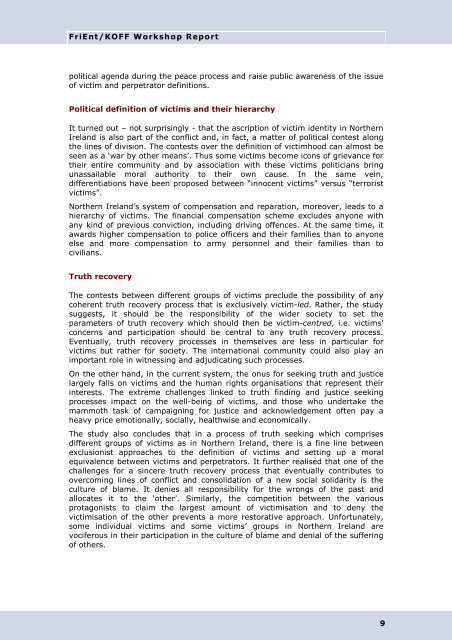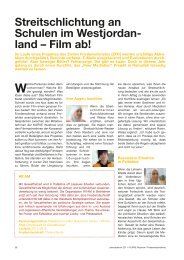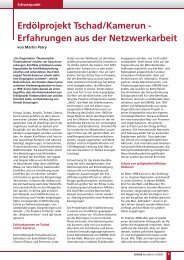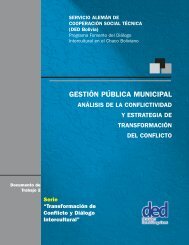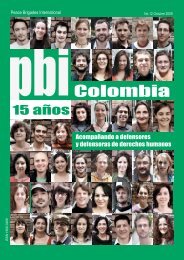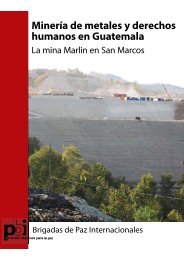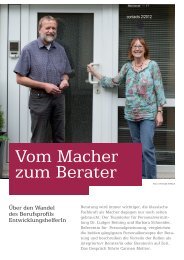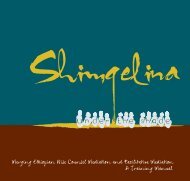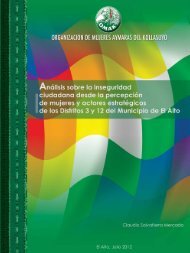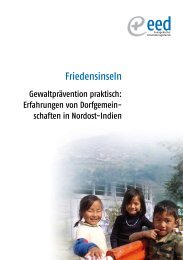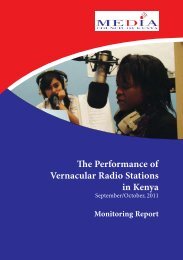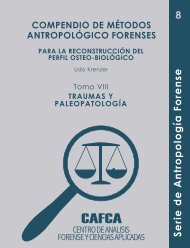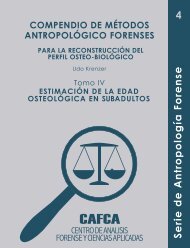Engaging with Victims and Perpetrators in Transitional ... - FriEnt
Engaging with Victims and Perpetrators in Transitional ... - FriEnt
Engaging with Victims and Perpetrators in Transitional ... - FriEnt
- No tags were found...
Create successful ePaper yourself
Turn your PDF publications into a flip-book with our unique Google optimized e-Paper software.
<strong>FriEnt</strong>/KOFF Workshop Reportpolitical agenda dur<strong>in</strong>g the peace process <strong>and</strong> raise public awareness of the issueof victim <strong>and</strong> perpetrator def<strong>in</strong>itions.Political def<strong>in</strong>ition of victims <strong>and</strong> their hierarchyIt turned out – not surpris<strong>in</strong>gly - that the ascription of victim identity <strong>in</strong> NorthernIrel<strong>and</strong> is also part of the conflict <strong>and</strong>, <strong>in</strong> fact, a matter of political contest alongthe l<strong>in</strong>es of division. The contests over the def<strong>in</strong>ition of victimhood can almost beseen as a ‘war by other means’. Thus some victims become icons of grievance fortheir entire community <strong>and</strong> by association <strong>with</strong> these victims politicians br<strong>in</strong>gunassailable moral authority to their own cause. In the same ve<strong>in</strong>,differentiations have been proposed between “<strong>in</strong>nocent victims” versus “terroristvictims”.Northern Irel<strong>and</strong>’s system of compensation <strong>and</strong> reparation, moreover, leads to ahierarchy of victims. The f<strong>in</strong>ancial compensation scheme excludes anyone <strong>with</strong>any k<strong>in</strong>d of previous conviction, <strong>in</strong>clud<strong>in</strong>g driv<strong>in</strong>g offences. At the same time, itawards higher compensation to police officers <strong>and</strong> their families than to anyoneelse <strong>and</strong> more compensation to army personnel <strong>and</strong> their families than tocivilians.Truth recoveryThe contests between different groups of victims preclude the possibility of anycoherent truth recovery process that is exclusively victim-led. Rather, the studysuggests, it should be the responsibility of the wider society to set theparameters of truth recovery which should then be victim-centred, i.e. victims’concerns <strong>and</strong> participation should be central to any truth recovery process.Eventually, truth recovery processes <strong>in</strong> themselves are less <strong>in</strong> particular forvictims but rather for society. The <strong>in</strong>ternational community could also play animportant role <strong>in</strong> witness<strong>in</strong>g <strong>and</strong> adjudicat<strong>in</strong>g such processes.On the other h<strong>and</strong>, <strong>in</strong> the current system, the onus for seek<strong>in</strong>g truth <strong>and</strong> justicelargely falls on victims <strong>and</strong> the human rights organisations that represent their<strong>in</strong>terests. The extreme challenges l<strong>in</strong>ked to truth f<strong>in</strong>d<strong>in</strong>g <strong>and</strong> justice seek<strong>in</strong>gprocesses impact on the well-be<strong>in</strong>g of victims, <strong>and</strong> those who undertake themammoth task of campaign<strong>in</strong>g for justice <strong>and</strong> acknowledgement often pay aheavy price emotionally, socially, healthwise <strong>and</strong> economically.The study also concludes that <strong>in</strong> a process of truth seek<strong>in</strong>g which comprisesdifferent groups of victims as <strong>in</strong> Northern Irel<strong>and</strong>, there is a f<strong>in</strong>e l<strong>in</strong>e betweenexclusionist approaches to the def<strong>in</strong>ition of victims <strong>and</strong> sett<strong>in</strong>g up a moralequivalence between victims <strong>and</strong> perpetrators. It further realised that one of thechallenges for a s<strong>in</strong>cere truth recovery process that eventually contributes toovercom<strong>in</strong>g l<strong>in</strong>es of conflict <strong>and</strong> consolidation of a new social solidarity is theculture of blame. It denies all responsibility for the wrongs of the past <strong>and</strong>allocates it to the ‘other’. Similarly, the competition between the variousprotagonists to claim the largest amount of victimisation <strong>and</strong> to deny thevictimisation of the other prevents a more restorative approach. Unfortunately,some <strong>in</strong>dividual victims <strong>and</strong> some victims’ groups <strong>in</strong> Northern Irel<strong>and</strong> arevociferous <strong>in</strong> their participation <strong>in</strong> the culture of blame <strong>and</strong> denial of the suffer<strong>in</strong>gof others.9


